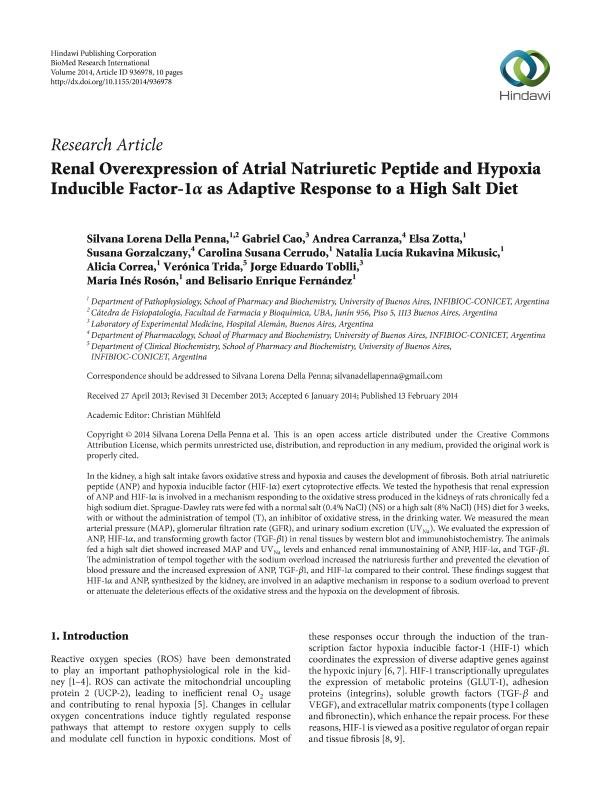Artículo
Renal overexpression of atrial natriuretic peptide and hypoxia inducible factor-1α as adaptive response to a high salt diet
Della Penna, Silvana; Cao, Gabriel Fernando ; Carranza, Maria Andrea
; Carranza, Maria Andrea ; Zotta, Elsa; Gorzalczany, Susana Beatriz; Cerrudo, Carolina Susana
; Zotta, Elsa; Gorzalczany, Susana Beatriz; Cerrudo, Carolina Susana ; Rukavina Mikusic, Natalia Lucía
; Rukavina Mikusic, Natalia Lucía ; Correa, Alicia; Trida, Verónica; Toblli, Jorge Eduardo
; Correa, Alicia; Trida, Verónica; Toblli, Jorge Eduardo ; Roson, Maria Ines
; Roson, Maria Ines ; Fernandez, Belisario Enrique
; Fernandez, Belisario Enrique
 ; Carranza, Maria Andrea
; Carranza, Maria Andrea ; Zotta, Elsa; Gorzalczany, Susana Beatriz; Cerrudo, Carolina Susana
; Zotta, Elsa; Gorzalczany, Susana Beatriz; Cerrudo, Carolina Susana ; Rukavina Mikusic, Natalia Lucía
; Rukavina Mikusic, Natalia Lucía ; Correa, Alicia; Trida, Verónica; Toblli, Jorge Eduardo
; Correa, Alicia; Trida, Verónica; Toblli, Jorge Eduardo ; Roson, Maria Ines
; Roson, Maria Ines ; Fernandez, Belisario Enrique
; Fernandez, Belisario Enrique
Fecha de publicación:
02/2014
Editorial:
Hindawi Publishing Corporation
Revista:
Journal Of Biomedicine And Biotechnology
ISSN:
2314-6133
Idioma:
Inglés
Tipo de recurso:
Artículo publicado
Clasificación temática:
Resumen
In the kidney, a high salt intake favors oxidative stress and hypoxia and causes the development of fibrosis. Both atrial natriuretic peptide (ANP) and hypoxia inducible factor (HIF-1α) exert cytoprotective effects. We tested the hypothesis that renal expression of ANP and HIF-1α is involved in a mechanism responding to the oxidative stress produced in the kidneys of rats chronically fed a high sodium diet. Sprague-Dawley rats were fed with a normal salt (0.4% NaCl) (NS) or a high salt (8% NaCl) (HS) diet for 3 weeks, with or without the administration of tempol (T), an inhibitor of oxidative stress, in the drinking water. We measured the mean arterial pressure (MAP), glomerular filtration rate (GFR), and urinary sodium excretion (UVNa). We evaluated the expression of ANP, HIF-1α, and transforming growth factor (TGF-β1) in renal tissues by western blot and immunohistochemistry. The animals fed a high salt diet showed increased MAP and UVNa levels and enhanced renal immunostaining of ANP, HIF-1α, and TGF-β1. The administration of tempol together with the sodium overload increased the natriuresis further and prevented the elevation of blood pressure and the increased expression of ANP, TGF-β1, and HIF-1α compared to their control. These findings suggest that HIF-1α and ANP, synthesized by the kidney, are involved in an adaptive mechanism in response to a sodium overload to prevent or attenuate the deleterious effects of the oxidative stress and the hypoxia on the development of fibrosis.
Palabras clave:
Hypoxia
,
Atrial Natriuretic Peptide
,
Salt
,
Fibrosis
Archivos asociados
Licencia
Identificadores
Colecciones
Articulos(ININCA)
Articulos de INST.DE INVEST.CARDIOLOGICAS (I)
Articulos de INST.DE INVEST.CARDIOLOGICAS (I)
Articulos(OCA HOUSSAY)
Articulos de OFICINA DE COORDINACION ADMINISTRATIVA HOUSSAY
Articulos de OFICINA DE COORDINACION ADMINISTRATIVA HOUSSAY
Articulos(SEDE CENTRAL)
Articulos de SEDE CENTRAL
Articulos de SEDE CENTRAL
Citación
Della Penna, Silvana; Cao, Gabriel Fernando; Carranza, Maria Andrea; Zotta, Elsa; Gorzalczany, Susana Beatriz; et al.; Renal overexpression of atrial natriuretic peptide and hypoxia inducible factor-1α as adaptive response to a high salt diet; Hindawi Publishing Corporation; Journal Of Biomedicine And Biotechnology; 2014; 9369; 2-2014; 1-10
Compartir
Altmétricas



